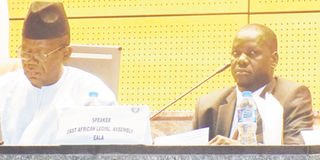New era beckons as EAC courts West African bloc

The Speaker of Eala, Mr Daniel Fred Kidega (right) and the President of the Ecowas Commission pay attention to the proceedings at the commencement of the 2nd Ordinary Session of the West African bloc in Abuja a fortnight ago. PHOTO | EALA
What you need to know:
- But they have different historical backgrounds which in a way have shaped their current activities, the number of member countries they have and the level of regional integration attained.
Arusha. The East African Community (EAC) and the Economic Community of West African States (Ecowas) may have similar agenda for their respective member states - economic integration.
But they have different historical backgrounds which in a way have shaped their current activities, the number of member countries they have and the level of regional integration attained.
While EAC - the original one - came into being as a result of economic and political ties that had built up during the colonial days of the British-ruled Tanzania, Uganda and Kenya, Ecowas came into being in 1975 and grouped together all West African states regardless of their colonial background.
They were those which were ruled by France, British, Spanish, Portuguese and those aligned to the Arab World. The bloc has not less than 15 members.
Although EAC remains the oldest - may be of all regional economic communities (RECs) in Africa - it has fewer members compared to Ecowas whose formation saw all countries within the vast west Africa automatically becoming members.
Unlike in the case of EAC, membership to Ecowas was automatic. For the former, new members had to apply to join the bloc with the exception of founders Tanzania, Uganda and Kenya. The latest entrant is South Sudan which was admitted in March this year. Burundi and Rwanda joined in 2007.
EAC is an intergovernmental organisation that was originally founded in 1967, collapsed in 1977 and revived in 2000. The organization is a potential precursor to the establishment of the East African Federation though the idea is still far from being realised.
Nonetheless, the EAC seems to have achieved something towards the economic integration goal. Six years ago, it launched its own common market for goods, labour and capital within the region, with the intention of creating a common currently and single currency.
Ecowas, founded on May 28th 1975 through the signing of the Treaty of Lagos, has a mission to promote economic integration across West Africa. It was founded in order to achieve ‘collective self-sufficiency” for its member states by creating a single large trading bloc through an economic and trading union.
Like the EAC, Ecowas has several institutions to implement its programmes. These include the Ecowas Bank for Investment and Development. EAC has the East African Development Bank (EADB). Ecowas also serves as a peace-keeping force within the region often hit by armed conflicts. The idea is still on the drawing board at EAC.
But the two blocs have largely been apart for many years, thanks to geographical distance.
Recently, however, there have been signs the situation was changing. Of course, initially this had much to do with the envisaged wider free trade area within the African continent.
Now the two blocs are increasingly forging political ties as seen during a visit by the Speaker of the East African Legislative Assembly (Eala) Daniel F Kidega to Abuja, Nigeria a fortnight ago where he addressed the Ecowas Parliament.
Use its experience
It appears Eala wanted to use its experience as one of the successful regional Parliaments in the African continent to assist its counterpart which has three times the number of member countries than its East African counterpart.
“The time for Ecowas Parliament to get legislative powers is now. Such a move would be a precursor to capacitate the Legislature to enact laws and respond to demand of the populace of the West African region,” he said when he addressed the Ecowas Parliament in the Nigerian capital Abuja on September 22nd.
He urged the 4th Legislature to speed up the push on the adoption and signing of the Supplementary Act on the Enhancement of powers of the said Parliament.
“It is in the best interest of the bloc to speed up integration in order to realize the aspirations of the founding fathers of Ecowas and those of its citizens,” Mr Kidega said, adding, “In order to realise integration to its fullest, this may perhaps be – an opportune moment for the Ecowas Parliament to transform itself into a legislative body capacitating it to enact laws that can influence change and to respond to the demands of the populations”.
He said Ecowas should be bestowed powers like budget appropriation and confirmation of statutory appointees of the institutions of the Community as is the case with Eala and that in order to attain that it should continue with the spirited campaign for the adoption and signing of the Supplementary Act on the Enhancement of the Powers of the Parliament, which shall give Ecowas Parliament the desired legislative powers.
Mr Kidega explained that Eala had contributed to strengthening of the integration process at the EAC - given its legislative powers, by passing over 70 pieces of legislation, all key to upping the stakes for stability and development in the EAC region.
“Having superintended over an Assembly with legislative powers, there are enormous benefits of such an arrangement for the integration process,” he added, remarking that it was also necessary for the discourse on legislative powers to be scaled-up to the continental level.
At the moment, the South African based Pan-African Parliament (PAP) is also campaigning for the ratification of the new Protocol that is envisaged to give it powers to pass model laws for the continent. The new Protocol needs at least 28 ratifications to be enforced. At the moment, 10 countries have ratified the instrument but only two have returned (deposited) the same with PAP.
Addressing the Parliament via a video conferencing facility, the President of Liberia and Chairperson of the Authority of Ecowas Heads of State and Government, Ms Ellen Johnson Sirleaf remarked that the Ecowas Parliament was a catalyst and indeed at the fulcrum of integration.
She added that Ecowas was committed to achieving its 2020 Vision of a borderless and peaceful region, devoid of terrorism and other insecurities, and one that embraces good governance and employs total free movement of persons in the bloc.




